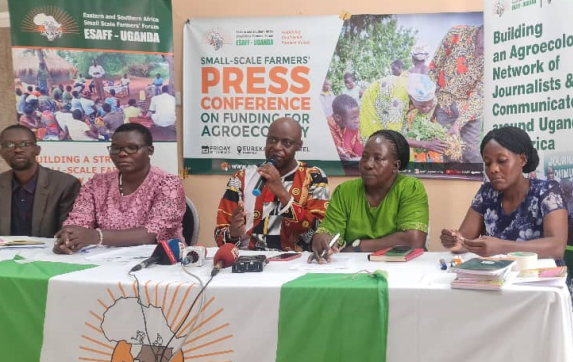Prime
Govt’s budget doesn’t solve our issues - small scale farmers

ESSAF Uganda chairperson Hakim Baliraine addresses a press conference in Kampala on June 30, 2023. PHOTO/BUSEIN SAMILU
A section of small-scale farmers under their umbrella body of the Eastern and Southern Africa Small Scale Farmers' Forum (ESSAF Uganda) have castigated the government for ignoring vital issues during the budgeting processes.
Finance minister Matia Kasaija last month read a Shs52.7 trillion FY2023/24 national budget intended to fully monetize Uganda’s economy through commercial agriculture, industrialization, expanding and broadening services, digital transformation and market access.
However, small scale farmers say this won’t be realised unless the government revise this budget and include issues that will help them directly.
“For example, on agricultural extension, the government should increase the funding for extension to meet the demands for the extension to cater for transport facilitation, recruitment, training, and equipping of extension workers for improved extension service delivery,” said ESSAF Uganda chairperson Hakim Baliraine as he noted that key areas in agriculture were ignored in the FY2023/24 budget.
In the budget, agriculture was allocated Shs1.7 trillion through the Agro-Industrialization program which is to be shared between Uganda’s government ministries, departments and agencies.
Addressing a press conference on their budget perspective, Baliraine urged more cross-sector funding.
“There is need to build the capacity of extension workers along with farmers’ initiatives like the farmer field schools that support small-scale farmers’ extension. Also, allocate more funds for the establishment of valley dams to promote irrigation since drip irrigation is limited to crops like tomatoes and other vegetables. Allocate funds for the boosting of agricultural credit facilities for small-scale farmers’ production and productivity,” he suggested.
Susan Mabonga, the Chairperson of the Bukiende Community Agroecology School longed for government funding towards mitigating climate change effects by encouraging nationwide tree planting and restoration of encroached wetlands and other natural resources.
“Invest more funds to post-harvest handling and storage facilities. Increase funding to seed management by supporting the farmer managed seed system and community seeds banks,” she observed.
She added: “Allocate more funds to community based financial institutions to ensure access to cheap credit and construct fruit processing factories in all regions especially in the northern and eastern region to minimize wastage and support value addition.”
For Christine Nabwami who is a farmer leader of ESSAFF in Mityana District, Uganda's food security and rural development depend on the country’s large number of small-scale farmers.
“The FY2023/2024 budget shows relative support for citizens, notably small-scale farmers recovering from Covid-19. This budget supports the transition from a raw materials-based economy to a manufacturing and knowledge-based one, but allocation to human development is constrained,” she highlighted.
She adds that “agroecology investment is needed to promote value addition, business growth, and employment creation for youth, women, and all Ugandans.”




